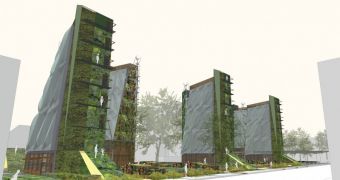A project that envisions a state-of-the-art food production testing and learning facility has recently taken top honors in a design competition. Daniel Toole won the 5th Annual Cavin Family Traveling Fellowship award for his design, “Whittier Organic Food Center Towers”.
The jury praised Toole’s project as “a comprehensive solution with attention to keeping a small footprint.”
Critical criteria in determining the winner included sustainable construction technologies, passive environmental control systems, recycled/renewable materials and finishes.
In the designer’s vision, the project aims “to become a catalyst for a new form of Southwestern urbanism, utilizing the land, a small footprint, the sun and the scarce water supply.”
Besides being a state-of-the-art food production testing facility, the center“ creates opportunity for social sustainability,” by leasing areas for micro-agro business, storing crops for disaster relief, local distribution and sales, and housing an on-site food bank.
Ultra light weight thin film photovoltaic integrated ethylene tetrafluoroethylene (ETFE) pillows are used to provide housing for greenhouses as they expand and contract by pumping air through them, controlling high to low insulation values.
They are made of high-recycled content, self clean, and blow away like flakes in fire, making them highly efficient. They are tensile and work perfect for rainwater and condensation harvesting thanks to a smooth surface and variable temperature.
Reclaimed wood screens, recycled steel, and high fly ash concrete are all made and fabricated locally minimizing carbon emissions.
“By flipping the largest program vertically, we utilize the higher altitude for on-site energy generation through increased wind and solar exposure, while the essential function of hydroponics is allowed to happen with natural gravity. A bar scheme is hard to maximize passive solar and wind also diminish permeable green space and the openness of the site to the community. Towers are the way!” Toole explained.
The Cavin Fellowship awards an architecture graduate or practitioner age 35 and younger $10,000 to advance their education through self-devised foreign travel-study. Toole is using his grant to document climate-responsive urbanism in Scandinavia, Portugal, Spain, Italy, Greece and Turkey.

 14 DAY TRIAL //
14 DAY TRIAL //